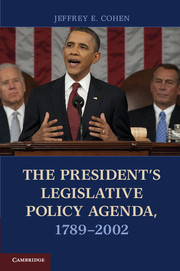Book contents
- Frontmatter
- Contents
- List of Figures
- List of Tables
- Introduction
- Chapter 1 The President's Legislative Policy Agenda
- Chapter 2 Studying Agenda Building
- Chapter 3 A Theory of Presidential Agenda Building and the Congressional Response
- Chapter 4 The Size of the President's Agenda, 1789–2002
- Chapter 5 The Substantive Content of Presidential Agendas
- Chapter 6 Divided Government and Presidential Policy Moderation
- Chapter 7 From the White House to Capitol Hill
- Chapter 8 Conclusion
- Bibliography
- Index
Chapter 8 - Conclusion
Published online by Cambridge University Press: 05 November 2012
- Frontmatter
- Contents
- List of Figures
- List of Tables
- Introduction
- Chapter 1 The President's Legislative Policy Agenda
- Chapter 2 Studying Agenda Building
- Chapter 3 A Theory of Presidential Agenda Building and the Congressional Response
- Chapter 4 The Size of the President's Agenda, 1789–2002
- Chapter 5 The Substantive Content of Presidential Agendas
- Chapter 6 Divided Government and Presidential Policy Moderation
- Chapter 7 From the White House to Capitol Hill
- Chapter 8 Conclusion
- Bibliography
- Index
Summary
This book opened with two puzzles, the divided government puzzle and the modern president puzzle. The divided government puzzle asks, Why do presidents allow themselves to be defeated so often when faced with an opposition-controlled Congress when there are things that they can do to avoid or lessen the high rate of defeat, such as refraining from submitting legislative proposals that are destined for defeat? The modern government puzzle asks, Why do modern presidents submit such large legislative agendas to Congress when the research on their relations with Congress suggests that they will have difficulty obtaining support from Congress for their proposals?
Although seemingly different, these two puzzles ask essentially the same question, but in different contexts: Why do presidents allow themselves to be defeated so often? To resolve these puzzles, I offered the theory of congressional anticipations. That theory argues first that presidents read the congressional environment for clues concerning the likely action that Congress will take on their legislative proposals. The theory then argues that presidents want to avoid congressional defeat of their proposals because of the costs of such defeats. Presidents have several options if they expect a proposal to be defeated. They can withhold the proposal, that is, not submit it for legislative consideration, they can modify the proposal to make it more acceptable to Congress, or they can accumulate additional resources to enhance their bargaining situation with Congress.
- Type
- Chapter
- Information
- The President's Legislative Policy Agenda, 1789–2002 , pp. 256 - 274Publisher: Cambridge University PressPrint publication year: 2012

